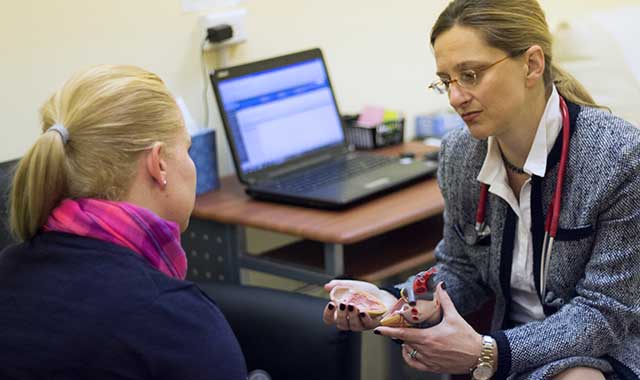Although it’s the top killer of women, heart disease doesn’t have to be a foregone conclusion. Here are a few simple things that can help to keep your heart in good shape.

Every day, Dr. Agnieszka Silbert sees the powerful impact of heart disease. The owner of Advanced Preventative Cardiology, 650 Spring Hill Ring Road, in West Dundee, and medical director of The Women’s Heart Center at Presence Saint Joseph Hospital in Elgin, Silbert is a non-invasive cardiologist who specializes in cardiac diseases in women and men, as well as advanced diagnostic and preventative cardiology.
She knows that women need to pay particular attention to heart disease, which is the leading cause of death among women. According to the American Heart Association, more than one in three adult women has some form of cardiovascular disease.
“We’re becoming overweight and obese due to poor eating habits and lack of exercise, which leads to coronary heart disease, hypertension and disability,” she says. “When you break the chain of eating sugars and processed foods, and begin eating the proper nutrients, patients require less medication and fewer visits to the doctor. They feel like they are curing themselves.”
Silbert offers five basic tips for keeping your heart healthy.
1. Visit Your Physician
Women of any age should make regular appointments with their doctors, and evaluate potential risk factors. “Your doctor may order blood work to check your cholesterol to help establish a baseline,” she says. “This is especially important for women who’ve suffered complications while pregnant. Elevated blood pressure and diabetes during pregnancy place a woman at risk for future heart problems. It’s crucial that we know what, if any, risks you have, before we talk about managing the risk.”
2. Stay Active
The key to staying with an exercise program is starting one. “I have patients who range from couch potatoes to marathon runners,” Silbert says. “What I tell my patients is to do as much exercise as you can, and don’t get frustrated with what you can’t do.”
There are varying guidelines for just how much exercise you need. For example, the World Health Organization recommends 150 minutes of strenuous exercise a week. The American Medical Association suggests exercise at least 4 to 5 times a week. Silbert suggests buying a pedometer and making a goal of walking 10,000 steps a day.
“Start with five minutes a day, and work your way up to 30 minutes,” she says. That includes walking, swimming, yard work and moderate weightlifting. Hire a personal trainer or find a workout buddy, if it helps to keep you accountable.
3. Change Your Eating Habits
Dr. Silbert detests the word diet – she prefers calling it a lifestyle change. “There’s not one perfect diet,” she says. “Too many people follow crazy programs that aren’t attainable.”
Instead, making a few simple changes can make a big difference. Start by avoiding processed foods. “If the label has more than two ingredients you can’t read, it’s probably not good for you,” Silbert says. Instead, eat a diet rich in vegetables, fruits, whole grains and fiber. Eat wild-caught fish at least twice a week. Avoid sugar, flour and salt. In restaurants, opt for smaller plates to control your portion.
4. Manage Your Stress
Stress is inevitable, but how you manage it is the key. “If you hold a glass of water for five seconds, your arm probably won’t hurt,” says Silbert. “But if you have to hold the glass for three hours, now that’s a different story. The same goes with stress. The longer you hold onto it, the bigger concern it will become.”
Instead of holding it in, deal with stress by trying meditation, biofeedback, counseling or exercise.
5. Take It Step by Step
Developing a better lifestyle doesn’t happen all at once. Silbert recommends creating a step-by-step action plan, similar to a business plan. “In January, for example, tackle nutrition, and then add exercise to your program in February, and so on,” she says. “It takes time. The only way you’re going to see results is to make healthy changes a series of ongoing events.”




















































